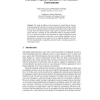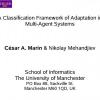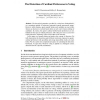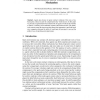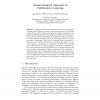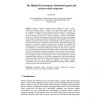105
Voted
CIA
2006
Springer
15 years 4 months ago
2006
Springer
Abstract. In dynamic applications characterised by a variety of alternative services with the same functionality but heterogeneous results, agents requesting services must find an ...
116
Voted
CIA
2006
Springer
15 years 4 months ago
2006
Springer
We present a hybrid algorithm for distributed task allocation problem in a cooperative logistics domain. Our approach aims to achieve superior computational performance by combinin...
108
click to vote
CIA
2006
Springer
15 years 4 months ago
2006
Springer
Abstract. We adopt the Markov chain framework to model bilateral negotiations among agents in dynamic environments and use Bayesian learning to enable them to learn an optimal stra...
80
Voted
CIA
2006
Springer
15 years 4 months ago
2006
Springer
100
click to vote
CIA
2006
Springer
15 years 4 months ago
2006
Springer
The theoretical guarantees provided by voting have distinguished it as a prominent method of preference aggregation among autonomous agents. However, unlike humans, agents usually ...
89
Voted
CIA
2006
Springer
15 years 4 months ago
2006
Springer
Abstract. Agents may choose to ignore contract violations if the costs of enforcing the contract exceed the compensation they would receive. In this paper we provide an argumentati...
89
Voted
CIA
2006
Springer
15 years 4 months ago
2006
Springer
We present a mechanism for collaboration and coordination amongst agents in multi-agent societies seeking social equity. This mechanism allows to compute egalitarian allocations of...
100
click to vote
CIA
2006
Springer
15 years 4 months ago
2006
Springer
This paper presents an agent-based approach for error detection in incident management organizations. The approach consists of several parts. First, a formal approach for the speci...
91
Voted
CIA
2006
Springer
15 years 4 months ago
2006
Springer
The paper describes a decentralized peer-to-peer multi-agent learning method based on inductive logic programming and knowledge trading. The method uses first-order logic for model...
CIA
2006
Springer
15 years 4 months ago
2006
Springer
Imagine a future environment where networks of agents - people, robots and software agents - interact with sophisticated sensor grids and environmental actuators to provide advice,...

